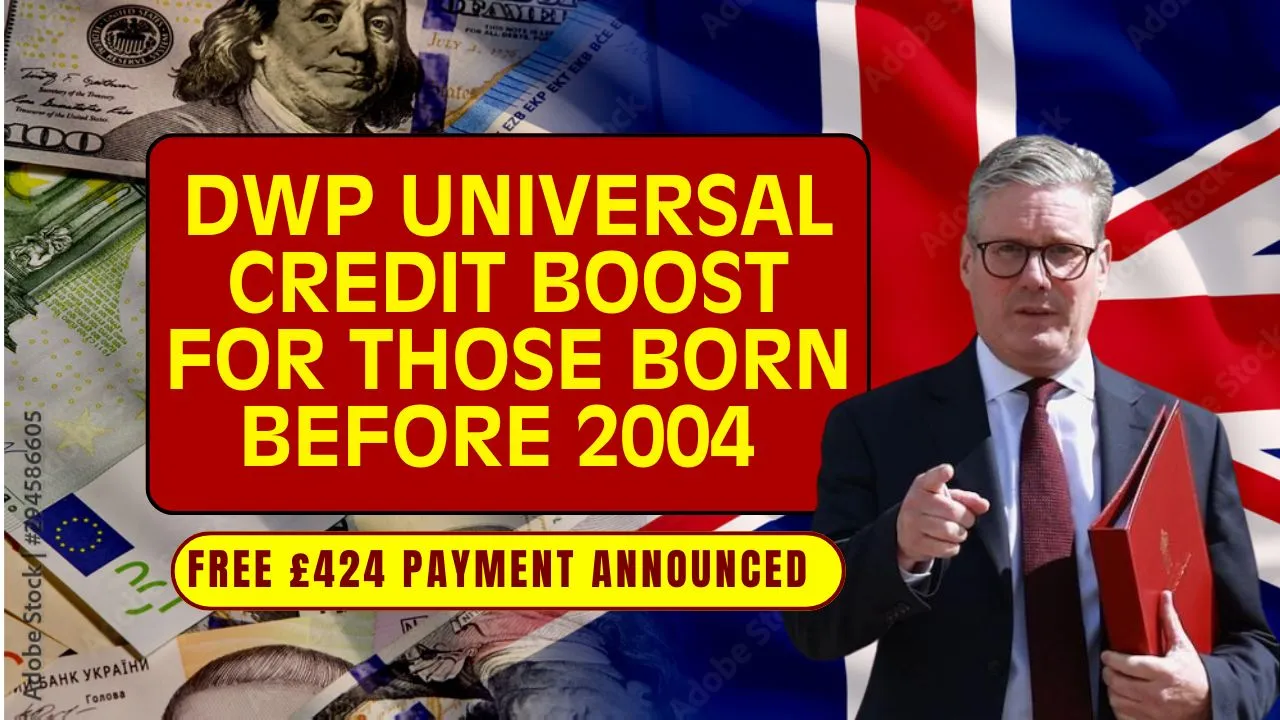£424 per month or £106 per week: In response to the mounting financial strain faced by millions of UK residents, the Department for Work and Pensions (DWP) has introduced a new financial measure designed to benefit Universal Credit recipients born before 2004. This move will result in an extra £424 per month or £106 per week for those who meet the eligibility criteria. The goal is to support adults aged 25 and over, especially single claimants, as the rising cost of living continues to affect households nationwide.
Set to begin in 2025, this Universal Credit boost reflects a broader welfare reform approach. It is part of the government’s effort to adjust benefits to better support low-income individuals and respond to economic shifts. If you are currently receiving Universal Credit or are eligible to apply, this payment increase could significantly improve your monthly budget.
DWP Universal Credit Boost For Those Born Before 2004
The DWP Universal Credit Boost For Those Born Before 2004 is a carefully targeted policy change that aims to uplift individuals who are often most vulnerable to economic hardship. Claimants aged 25 and over, particularly those living alone or in single-income households, are set to gain from this increase in their monthly allowance. With inflation pushing up the cost of rent, energy, food, and other essentials, the £424 monthly boost is a timely adjustment. Unlike temporary assistance schemes, this is a structured and recurring increase under the DWP’s benefit framework, reinforcing the government’s push for fairer, long-term support.
Universal Credit Increase Overview Table
| Eligibility | Weekly Increase | Monthly Boost | Implementation Year |
| Single Claimants, Age 25+ | £106 | £424 | Starts in 2025 |
| Born Before 2004 | Eligible | Phased by 2029 | End of Parliament Goal |
What is Universal Credit and Why is This Change Important?
Universal Credit is a single monthly payment designed to help people with low incomes cover their basic living costs. It replaces six legacy benefits, streamlining welfare into a single, accessible system. While its structure allows flexibility, its current rate has not always kept pace with economic challenges.
This change is important because it signals a shift toward more sustainable support. As household costs increase, the DWP’s decision to boost Universal Credit for claimants born before 2004 helps to close the gap between income and expenses. It is especially impactful for those who rely solely on this payment for rent, bills, and essential items.
How Much Will Universal Credit Payments Increase?
Starting in 2025, eligible recipients will see an increase of £106 per week, which totals £424 per month. This rise will be gradually implemented over the parliamentary period, with full adjustments expected by 2029–2030.
This boost is more than a symbolic gesture—it translates into tangible financial relief. For a claimant receiving the standard allowance, this could represent a 25–30% increase depending on their previous payment bracket. It provides added stability in a time when basic living costs continue to rise.
Eligibility for the DWP’s Universal Credit Boost
The eligibility requirements for this new financial increase are clearly defined to ensure that support reaches those who need it most. To qualify, you must:
- Be aged 25 or over, meaning you were born before 2004.
- Be a current Universal Credit claimant, or meet the criteria to apply.
- Primarily live in a single-adult household. While couples and families may benefit indirectly, the payment structure favors single individuals.
- Reside in the UK and remain compliant with DWP requirements regarding income reporting and work activity.
These conditions reflect the government’s focus on providing targeted support to a group often underrepresented in past welfare adjustments.
What Does the New Bill Entail?
Beyond Universal Credit, the DWP’s new legislation includes significant reforms to Personal Independence Payment (PIP). Under the proposed updates, claimants must score a minimum of 4 points on at least one daily living activity to qualify for the daily component of PIP.
While this threshold is intended to streamline assessments, it may lead to increased scrutiny for some long-term claimants. Disability rights groups have expressed concern over potential reductions in support, particularly for those with hidden or long-term conditions.
Nonetheless, the Universal Credit boost remains a separate and guaranteed change for qualifying recipients, independent of the outcomes in the PIP reforms.
Key Dates to Know
Staying aware of important deadlines is critical for claimants looking to benefit from these changes:
- 2025: Start of the rollout for the Universal Credit increase.
- November 2026: Changes to PIP eligibility come into effect.
- End of Parliament (2029–2030): Full implementation of the payment boost for everyone born before 2004.
These milestones will help determine when individuals see adjustments to their payments and how reforms may influence broader welfare access.
How Will This Impact Claimants?
The new £424 monthly payment boost will offer much-needed relief for thousands of individuals. Its impact will be felt in several ways:
- Reduced financial pressure for single adults on fixed incomes.
- Greater consistency in payment levels across age brackets.
- Improved ability to meet essential living expenses without resorting to debt.
While this news is generally positive, the DWP’s simultaneous reforms to disability payments may complicate the outlook for some. Balancing expanded support with tighter PIP eligibility creates uncertainty for people who rely on both forms of benefit.
FAQs
1. When will I start receiving the £424 monthly Universal Credit increase?
The payment increase will begin rolling out in 2025, with full implementation for all eligible claimants expected by the end of Parliament (2029–2030).
2. Do I need to apply for the new Universal Credit payment boost?
No. If you are already a qualifying claimant (aged 25+ and born before 2004), your payment will be automatically adjusted by the DWP.
3. What if I turn 25 in 2025—will I still be eligible?
Yes, as long as you were born before 2004, you will qualify once you meet the age threshold of 25 and meet other criteria.
4. Will couples or families receive the same £424 increase?
The full boost is directed at single claimants. Those in couples or with dependents may see different adjustments depending on their household structure.
5. How do PIP changes affect my Universal Credit?
They do not affect your Universal Credit directly, but upcoming PIP reforms in November 2026 may impact total benefits for those claiming both supports.
Final Thought
The DWP Universal Credit Boost For Those Born Before 2004 represents a significant step toward fairer, more responsive welfare support. As prices continue to rise and pressures mount, this boost of £424 per month could make a real difference in the lives of those who qualify.
If you or someone you know is receiving Universal Credit and meets the age criteria, there’s no need to apply—just make sure your information with the DWP is up to date. For those considering a claim, now may be the ideal time to explore eligibility and start receiving the support you deserve.
Don’t miss out—stay informed, review your claim status, and take full advantage of the benefits available to you.











